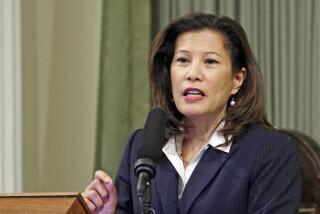Price of Success for Private Judging
- Share via
Dispute resolution, mediation, arbitration and private judging have become big in recent years, as moneyed litigants eager to avoid the congestion and scrutiny of the regular civil court system hire someone to resolve their case.
It is not surprising, therefore, that the private judging business is undergoing some growing pains in the areas of fees and ethics.
Putting aside for another time the question of whether there should be one system of civil justice for those with money and another for the rest of us, these growing pains aren’t at all a bad thing. For those with the funds to avoid the overloaded civil court system, it is often more expeditious and may even be cheaper these days to hire retired judges, or even outsiders to the legal system, to settle their dispute.
This is increasingly so, as market forces come into play in what clearly is a growth industry.
A short while ago, for example, I received a letter, a copy of a mailing to 130 lawyers, from Sue L. Himmelrich, a Columbia law school graduate and experienced litigator with big law firms in Los Angeles. She was offering to perform so-called alternative dispute resolution (known as ADR) for less than the prevailing rate.
“I am writing,” she said, “because I suspect that you have become disenchanted with the ADR services available to you--with the quality, with the cost and with the results. I certainly have. The last straw for me came when I received notice in a small case that our court-assigned arbitrator would be charging $400 per hour. . . .
“My fee is $250 per hour. Not per hour per party. Not per 50-minute hour. Not plus room rental and coffee charges. No, I will charge $250 for every real hour I spend.”
Of course, $250 an hour is still a lot of money. But what is the going rate for such work? For moneyed interests locked in big disputes, it’s considerably higher than $250.
As it turned out, Pepperdine University’s Straus Institute for Dispute Resolution was having a daylong conference on ADR last weekend, and its director, Randolph Lowry, was moderating a session on “Marketing Mediation . . . “ He told me I’d be welcome.
Lowry lost no time in asking two experienced mediators, independent practitioner Jeffrey Krivis of Encino and Bruce Edwards, executive vice president of the national private judging firm JAMS/Endispute, what they charged.
Krivis said he earns $15,000 a week. (Earlier, he had mentioned to me $4,000 a day for a mediation he currently is conducting, but added that for that amount he has worked 21-hour sessions).
Edwards answered, “About $400 an hour . . . and right now I’m booked through March.”
Krivis, Edwards and Paul N. Young, executive director of the National Mediators Group, based in Marina del Rey, are more than a little dubious about Himmelrich’s price-cutting.
“If we’re dealing with a multimillion-dollar dispute, then cost is not an object,” Krivis said. “If someone wants to charge a couple of hundred dollars an hour less, that’s not going to make a difference in the market.”
Edwards said of Himmelrich, “She’s a very well-qualified litigator. But I probably get about a dozen solicitations a week from people with blue-chip credentials looking to get into ADR. Of the attorneys we cull there are ultimately very few that become successful. Often, it’s very different from a successful litigation career.”
Himmelrich responded, “They will be even more ticked off at me, if I manage to make inroads.”
But, more power to her. Certainly, this field can stand price competition.
Meanwhile, the question of ethics continues to roil ADR waters no less than fees.
Last year, retired appeals court Justice John Trotter, a JAMS founder caught in a dispute about taking a cruise with a trial lawyer, dismissed ethics concerns, declaring: “I’m not a judge. I don’t sit on assignment. I don’t do a judge’s work. I do mediation. . . . “
But Trotter’s remarks made some of his JAMS colleagues uncomfortable, and views within JAMS, which has long had ethics guidelines, now emphasize a commitment to conflict-of-interest standards.
Earlier this year, California Chief Justice Ronald George appointed a task force to examine private judging and ADR, and one of its subcommittees, headed by Dean Jay Folberg of the University of San Francisco law school, is mulling new ethics rules.
Folberg recently asked for a few more months, beyond the subcommittee’s March 1999 deadline, to file its final report.
“The problem is not deciding whether to have ethical standards,” he observed. “The problem is deciding the extent.”
For instance, he said, there are rules against sitting judges raising money for charity, but this is work many retired judges have been performing, and “I’m not sure anybody is saying this is wrong. . . . If we applied blanket ethics to everyone in all circumstances, we could do more harm than good.”
Other problems, he noted, are what to do about those in ADR who have never been lawyers, much less judges. Should they be put under regulation by the State Bar, or should a new state agency be created to enforce any code?
“We need to be cautious before making any recommendations,” he said.
But, as ADR becomes more important, it’s only right all these questions are getting careful consideration.
*
Ken Reich can be contacted with your accounts of true consumer adventure at (213) 237-7060, or by e-mail at ken.reich@latimes.com


